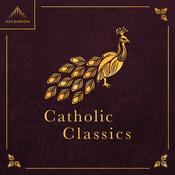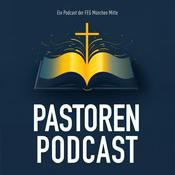Christian Questions Bible Podcast
Rick and Jonathan

Najnowszy odcinek
239 odcinków
- The blueprint for Christian Character development that the Apostle Peter gives us in 2 Peter chapter 1 focuses us on a profound series of steps we need to take in order to be more Christlike. Based upon God’s power and promises, Peter lays out for us the blueprint for a ladder of Christian character development. Peter has taught us that each rung of this ladder is very important to our success in climbing onto the next rung up. In the last four parts of this series, we have focused on one rung of this ladder at a time. We worked on making the connections between what our foundation is and how each step makes us more like Jesus.
Step 5 on the ladder
Christian perseverance is the fifth step following faith, moral excellence, knowledge and self‑control. Perseverance means “cheerful, hopeful endurance”—an active, conscious decision to “stay under” the weight of trials with constancy. It is not drudgery. It is a spiritually energized commitment to keep moving forward.
Perseverance is essential because self‑control can’t survive without it. Scripture shows that perseverance grows out of justification, peace with God, and His grace (Romans 5), and is modeled perfectly by Jesus in his endurance of the torturous cross experience (Hebrews 12).
Developing endurance
Christians develop perseverance through three major arenas: trials, persecution and loyalty testing. Trials cultivate endurance that leads to maturity, as seen in James’ teaching and in real-life examples of believers who endure suffering with faith. Persecution requires principled perseverance, following Jesus’ example of non-retaliation and trusting God’s power when feeling afflicted or targeted. Loyalty testing cultivates perseverance that glorifies God in every circumstance, choosing prayer, spiritual perspective, and Christlike responses over fleshly reactions.
Perseverance strengthens what has already been built—faith, moral excellence, knowledge and self‑control—while enabling continued spiritual growth. Ultimately, perseverance is the allegiance of our energy to God’s will, empowered by His spirit, inspired by Jesus’ sacrifice, and necessary to receive the promised reward. It keeps us from giving up, restores our confidence and helps us “run and not grow weary” as we walk in Christ’s footsteps.
Key Takeaways
Perseverance = cheerful, hopeful endurance, not mere survival.
Self‑control collapses without perseverance; endurance keeps spiritual progress intact.
Jesus is the model of joyful endurance, inspiring us not to lose heart.
Trials develop maturity, producing endurance that leads to completeness.
Persecution requires principled perseverance, following Jesus’ example of never retaliating.
Loyalty to God is proven through endurance, glorifying Him in every circumstance. What Kind of Self-Control Is Really Required of a Christian? (Christian Character Series Part V)
09.02.2026 | 31 min.The blueprint for Christian character development that the Apostle Peter gives us in 2 Peter 1 focuses us on a profound series of steps we need to take in order to be more Christlike. As a basis for this needed growth, we have seen how God’s promises help us to be ready to systematically take the next step up Peter’s “ladder” of Christian character development. So far in our series, we have begun to see how each step up this ladder needs the step before in order to actually bring us towards true daily discipleship. We now continue this character development process by looking into the fourth step up towards Christlikeness.
This fourth rung in Peter’s “virtue ladder” from 2 Peter 1:5‑7 is self‑control, the “allegiance of our passions.” The first three rungs—faith, moral excellence and knowledge, deal primarily with internal transformation. Self‑control is the pivot point where that inner work begins to show up in real‑world choices. The Greek word for this conveys mastery, inner power and dominion over oneself.
For Christians, this begins with preventing harmful or unproductive thoughts from becoming actions, and culminates in actively choosing what is spiritual, wholesome and Christlike. Our discipline requires self‑examination: identifying what naturally pulls us off course so we can learn to make adjustments.
The self-control of an athlete running a race
Paul’s athletic metaphors in 1 Corinthians 9 highlight three components of self-control: intentional focus on the goal, embracing necessary limitations and wholehearted perseverance. Like a trained athlete, we as Christians must make many daily small, disciplined choices that strengthen spiritual “muscle memory.” Self-control also shapes how we view and treat others, enabling us to respond with grace rather than instinctive frustration.
It’s important to recognize that self-control is not a standalone virtue, and it stabilizes the entire structure of our Christian characters. Without knowledge, self-control becomes directionless; without self-control, perseverance becomes impossible. When rooted in faith, moral excellence, and knowledge, self-control opens the door to genuine spiritual growth and Christlike living.
Key Takeaways
Self-control is the “allegiance of our passions,” the disciplined governing of our impulses and desires.
It is the pivot point where inner transformation becomes outward behavior.
True self-control begins with restraint and culminates in choosing what is spiritually beneficial.
The Apostle Paul’s athletic imagery teaches focus, limitation and perseverance as essential components.
Self-control shapes how we respond to others, reflecting Christ rather than our impulses.
It stabilizes the entire virtue ladder and enables the next step: perseverance.How Does Knowledge as a Christian Change My Worldly Life? (Christian Character Series Part IV)
02.02.2026 | 29 min.In 2 Peter 1, the Apostle Peter laid out a phenomenal blueprint for us to follow regarding the how and why of developing a focused and loyal character that is modeled after Christ. After reminding us of the incomprehensible promises that God brings us through His power and Jesus’ sacrifice, he then focuses us on doing our part. Peter gives us a blueprint for building a virtue “ladder” of Christian character development, of which the first rung is our faith. Because we have the firm footing of Christian faith in place, we can then develop “moral excellence,” which in turn gives us the stability to next develop knowledge. As we will continue to see, when followed, the order of developing these attributes of our Christian characters will yield an unbreakable allegiance to daily, living God’s will through Christ!
Peter’s ladder sequence is intentional: faith establishes our direction, moral excellence aligns our heart with God’s highest standards, and only then can knowledge become a stable, Christlike attribute rather than a source of pride or harm. By contrasting godly vs. misapplied knowledge, we can see that without moral excellence, it can inflate ego and harm others. Paul’s teaching in 1 Corinthians 8 shows that even correct knowledge can become destructive if it emboldens weaker Christians to violate their conscience. True Christian knowledge must therefore be governed by love, humility and responsibility.
How much of the Bible do I have to know?
This is not about mastering every prophecy or detail, but about understanding Christlikeness and allowing God’s light to shape our intellect. All Scripture – both in the Old and New Testaments – is the essential source of this knowledge, forming a lifelong journey of discernment, filtering out worldly influences, and taking every thought captive to Christ.
God’s plan is expansive, merciful and awe‑inspiring.
Recognizing its depth should cultivate gratitude rather than arrogance. Paul’s example in Philippians 3 shows the surpassing value of knowing Christ, which makes all previous accomplishments seem like “rubbish” in comparison. Ultimately, knowledge becomes transformative when it flows from faith, is shaped by moral excellence, and leads us toward deeper loyalty to God’s will.
Key Takeaways
Knowledge must be built on faith and moral excellence to avoid arrogance.
Misapplied knowledge can harm others while godly knowledge is always governed by love.
All Scripture is the authoritative source of Christian understanding.
True knowledge produces humility, responsibility and awe at God’s plan.What Does True Christian Moral Excellence Look Like? (Christian Character Part III)
26.01.2026 | 31 min.In 2 Peter chapter 1, the Apostle Peter is laying out a phenomenal blueprint for us to follow regarding the how and why of developing a focused and loyal character modeled after Christ. He begins by reminding us of the majesty and power of God, along with the loyalty and sacrifice of Jesus. He tells us that because God is as lofty as He is, we are given incomprehensible promises that can bring us to God’s own divine nature. He then tells us what’s required on our part. Peter explains that because of these promises, we need to apply all diligence, and in our faith, we need to supply – to develop and live – a character that will nurture and grow specific virtues of Christlikeness.
As we continue our Christian Character Series, the second “Allegiance Attribute” in Peter’s spiritual blueprint is moral excellence. Building on the foundation of faith, we find that that moral excellence is not merely good behavior but wholehearted allegiance of the heart—a life shaped by God’s purpose and modeled after His own character. This excellence evokes the idea of something fulfilling its highest purpose, like a horse that runs fast, or land that produces abundantly. For Christians, this moral excellence means living in a way that reflects God’s excellence and demonstrates that His purpose truly matters to us.
Inward excellence and outward goodness
This inward excellence naturally produces outward goodness, the visible conduct others can observe. Drawing from several scriptures, we can observe how moral excellence expresses itself through humility, patience, forgiveness, perseverance, gratitude and Spirit‑led transformation. True Christian virtue is not simply avoiding wrongdoing but actively embodying Christlike character in everyday interactions.
The challenge is that God’s standard is high, and we will fail repeatedly. Yet Peter reassures us that God has already provided “everything pertaining to life and godliness,” equipping us through His promises to grow into His divine likeness. Moral excellence becomes possible, not because we are strong, but because God is faithful.
Ask yourself: Is my moral excellence stronger today than yesterday? Am I becoming the person God intends me to be?
Key Takeaways
Moral excellence is the allegiance of the heart, reflecting God’s character and purpose.
Inner excellence produces visible goodness.
True virtue requires intentional growth, not just avoiding sin but embodying Christlike qualities.
God equips believers with everything needed to develop moral excellence through His promises.
Spiritual progress requires perseverance, humility and daily habits that nurture transformation.What Steps Help Me Build a Permanent Christlike Character? (Christian Character Series Part II)
19.01.2026 | 27 min.The Apostle Peter began his second letter to all Christians by addressing the very formation of our Christian lives. He proceeded to lay out a deep and profound series of character development steps to show us how to completely and wholly grow into mature disciples of Christ. In Part I of this series, we covered the first four verses of 2 Peter chapter 1. These verses laid out a broad foundation for the development of our Christian character that is based on who God is, what He promises us and what Jesus has done. The next part of the blueprint for our character development is to not only show us traits we need to have included in our Christlikeness, but HOW we are to include them. This episode reveals how Peter unfolds his spirit-driven, exciting and practical approach to building a true Christlike character.
Peter’s blueprint continues with a command: “…applying all diligence.” The Greek terms reveal a vivid picture—bringing our effort alongside what God has already supplied, and doing so with eagerness, earnestness and speed. Diligence is the opposite of sluggishness; it reflects a focused loyalty to God’s will. As we receive God’s promises, we are to simultaneously apply this diligence.
The first area where diligence must operate is our faith.
Faith is not a wish; rather, it is a conviction grounded in God’s reality. It is a gift, and though not earned, it must be tested, strengthened and lived. Trials develop endurance, and endurance matures character. Faith becomes what we call an “Allegiance Attribute”—a foundational internal quality that shapes all the other traits Peter will list.
Faith must be active, single‑minded and visible through works.
Just as Christ fully supplies the body and Christians supply one another, we are called to fully supply our own character with what it needs to grow. Ultimately, God abundantly supplies entrance into the eternal kingdom, far beyond mere adequacy. Our role is to respond to His overwhelming provision with the diligent and eager faith that fuels the lifelong process of Christlike transformation.
Key Takeaways
God’s promises form the foundation for Christian character development.
“Applying all diligence” means bringing earnest effort alongside God’s provision.
Faith is the first and foundational Allegiance Attribute.
Faith must be active, tested, single‑minded and visible through works.
Growth is mutual: God supplies us, we supply our character, and we in turn support others.
God’s supply is abundant and our response to it must be diligent and wholehearted.
Więcej Religia i Duchowość podcastów
Trendy w podcaście Religia i Duchowość
O Christian Questions Bible Podcast
Weekly podcasts from Rick and Jonathan dealing with life’s issues from a biblical perspective
Strona internetowa podcastuSłuchaj Christian Questions Bible Podcast, Ks. Piotr Pawlukiewicz i wielu innych podcastów z całego świata dzięki aplikacji radio.pl

Uzyskaj bezpłatną aplikację radio.pl
- Stacje i podcasty do zakładek
- Strumieniuj przez Wi-Fi lub Bluetooth
- Obsługuje Carplay & Android Auto
- Jeszcze więcej funkcjonalności
Uzyskaj bezpłatną aplikację radio.pl
- Stacje i podcasty do zakładek
- Strumieniuj przez Wi-Fi lub Bluetooth
- Obsługuje Carplay & Android Auto
- Jeszcze więcej funkcjonalności


Christian Questions Bible Podcast
Zeskanuj kod,
pobierz aplikację,
zacznij słuchać.
pobierz aplikację,
zacznij słuchać.






























